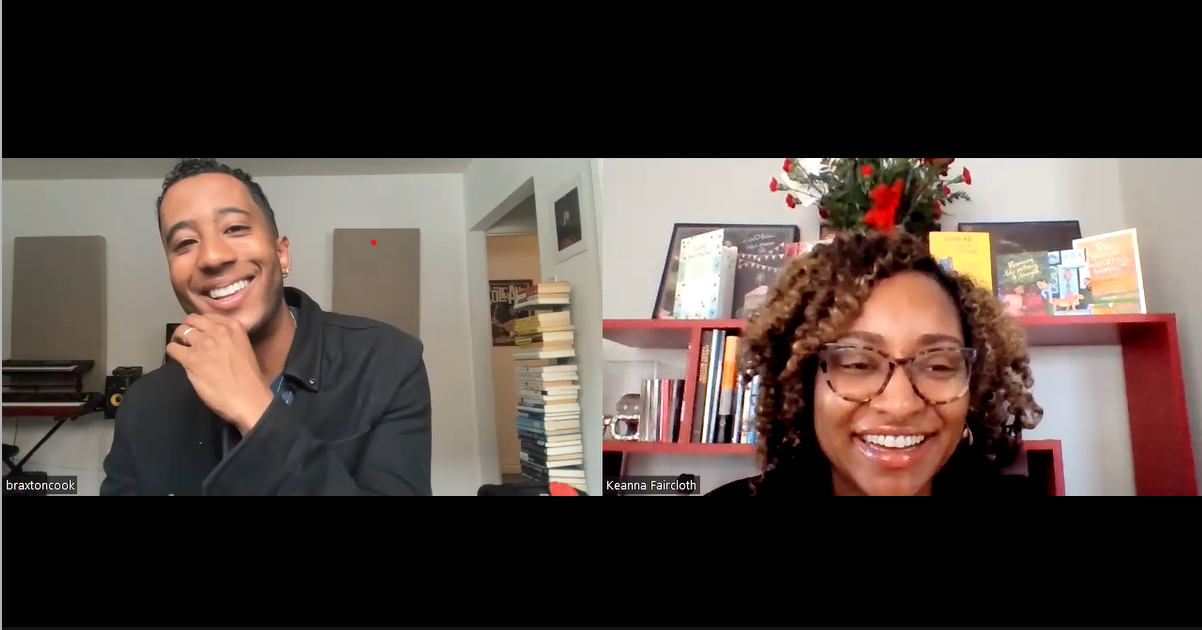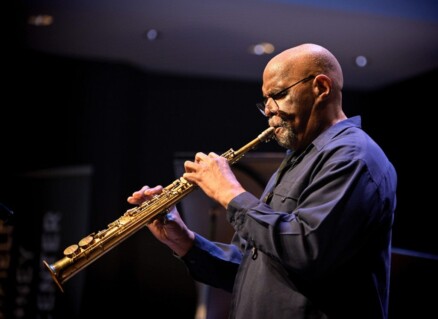Braxton Cook brings his experiences, inspirations and love of family to ‘Who Are You When No One Is Watching?’

There’s something to be said for an artist that doesn’t just make music with the objective of creating hits. Saxophonist and vocalist Braxton Cook is one of those: a musician who’s intentional about what he chooses to put out into the world, often driven by something greater than what’s on the surface.
A DMV native now based in Los Angeles, Cook says he pulls his inspiration from those that chose to use their music as a spiritual vessel. Like the works of the great jazz pioneers that came before him — such as John Coltrane and his A Love Supreme and Sonny Rollins with The Freedom Suite — he centers his playing around the issues of the day, calling attention to injustices, racism and those systems that have been designed to keep people of color disenfranchised. Cook said he has always wanted to use his music to change the status quo, and to “heal myself and to heal other people.”
The messages in Cook’s music are starting to be heard by a wider audience. After years on the road alongside Christian Scott aTunde Adjuah, he has recently been making waves as a solo artist, and his most recent album, Who Are You When No One Is Watching?, has received an enthusiastic response. He’ll bring the music from that record back to his hometown on Wednesday, when he appears at Songbyrd DC.
The work on this LP, Cook said, is a convergence of all that has inspired him and had a hand in creating his being: his beliefs, his experiences, and those elements that have built the man that he is beneath the surface. Cook’s goal has been to have his music represent snapshots of his life while showcasing his current perspective and ideas. He likes to think of each work as an individual mission statement. The album’s name reflects his current mission, Cook said. “I landed on the title initially by just wanting to share more of myself and my personality and just being more vulnerable,” he said. “I just wanted to share who I am in this stage of life through record form.”
What’s so distinctive about Who Are You When No One Is Watching? is that it packs a powerfully thought-provoking punch in a palatable, mainstream-friendly package. It’s like that spoonful of sugar that helps the medicine go down. All the while, his musical prowess and natural command of his instrument are undeniable. Cook is, without question, a multifaceted artistic force — he’s that same wunderkind that we witnessed when he was just beginning to cut his teeth at D.C. jazz clubs like HR-57 and Twins. The difference now is that he holds the wisdom and worldliness that can only come with experiencing the joy and pain of being a grown-ass Black man. The product of all of that converges on this album, and in his live performances.
Though originally known largely as an alto saxophonist, Cook is also a natural-born crooner. He possesses one of the most tender, nuanced voices on the scene today. The Prince George’s County, Md. native said he attributes his vocal capabilities to osmosis. He grew up listening to family members that, he said, could sing circles around him. “I’ve always felt like everyone in my family could sing. My dad could sing me down, for sure,” Cook said. “I just grew up around … people in my family that, to me, were amazing singers and it was like nothing to them. It isn’t something they pursued, it was just in the house. And growing up in church … going down to Mississippi where [my parents were from,] it was just part of our experience.” His little brother, Bryndon (of Starchild & the New Romantic), is also a singer and producer, currently making a name for himself as the music director for Solange.
After moving from PG County to Atlanta for a few years as a youngster, Cook moved back to Maryland for high school, attending Springbrook High School in Silver Spring. During Cook’s sophomore year at Springbrook, he really began to get serious about the saxophone after meeting fellow saxophonist Elijah Jamal Balbed and educator Paul Carr. One day that year, during a school assembly, Wynton Marsalis heard Cook playing lead alto saxophone on Ellington’s “It Don’t Mean a Thing (If It Ain’t Got That Swing)” and pointed out his abilities. Marsalis was running a workshop on how to “swing” and predicted that he was sure he’d be hearing from him in the future. This prediction took only a few years to come true; as a sophomore at the Juilliard School, Cook was playing in the atrium at the Jazz at Lincoln Center Gala when he got a chance to reconnect with Marsalis. In what he described as a full-circle moment, Marsalis recognized him again.
That evening became a turning point in Cook’s life. In many ways, it inspired him to create the intimate and thoughtful music on Who Are You When No One Is Watching?
Right after the gig at Jazz at Lincoln Center, Cook was invited to a ’90s-themed party at Columbia University with his best friend. He was buzzing, on a natural high after being recognized by Marsalis, feeling reassured that he was on the right path. That was also the night that he met his wife, Chaya Crowder. The track “90s” on the new album was inspired by that chain of events, and features the saxophonist-vocalist Masego, whom he met in 2015 at a listening party for The Fader magazine. He remembers Masego was standing on tables performing to a crowd that wasn’t even paying attention. He had a “busker kind of energy” that Cook was drawn to. They bonded: Their fathers are both pastors, and Masego attended high school in Newport News, Va. They became friends and musical collaborators, hanging out even more after Cook moved to Los Angeles in 2020.
In this new era of life, Cook is experiencing love in what he calls a complete, all-encompassing way. He glows when he talks about his wife and one-and-a-half-year-old son, August.

Artistically, things are just as fruitful. He even earned a production credit on Taylor Swift’s latest album Midnights on the lead track “Lavender Haze”.
Cook said he is grateful for his family and the clarity that they have given him, as he continues to navigate past the pressures that the pandemic presented. The lyrics to “The Answer,” featuring producer Orlando Watson, speak to this feeling: “I don’t know why / I can’t find the answers / I don’t know why / Times moving faster / I don’t know why / Are we moving backwards? / I don’t know why … I’ve been so reactive / I don’t know why / I’m losing my traction / Have I lost my passion? / I don’t know why.”
In many ways, Who Are You When No One Is Watching?, Cook’s seventh release and fourth full-length album, is a collection of therapeutic journal entries. It chronicles the shift in perspective that parenthood brings by exhibiting a different level of vulnerability and transparency. He also calls attention to the persisting sociopolitical and racial ills that plague Black people in this country, with an overarching theme of love and nostalgia.
L.P. Aekili Ross illustrated the album artwork, which depicts Cook and his new family. In this work, Cook also honors the elders in his family by showing gratitude for the sacrifices that his parents made, and the love and attention he was given during his upbringing. His parents are featured on the album, connecting tracks through conversational interludes. Baby August even makes his recording debut on “August’s Interlude”.
As a result of the love that was poured into him, Cook seems to have an unspoken mission to propagate Black love — a refreshing and a welcome change of narrative for Black men. The lyrics to “Statistics” talk about what he calls an “anomaly” for Black boys: to be healthy and thriving when, according to a 2021 report from the Sentencing Project, one in every 81 Black adults in the United States are currently incarcerated.
We beat the statistics / Don’t need analytics / Cause they have no business / With you / No we never did this / But if we stay committed / Aligned in our visions truth
So why they wanna talk about us? / Can you tell me, why they always wanna doubt us? / Tell me why they wanna talk about us / Cuz they ain’t got you / Cuz they ain’t got you
When he appears at Songbyrd this week, as part of his Black Nostalgia Tour, Cook plans to put a focus on the vocal element of his artistry by incorporating more medleys of his songs than he has in previous years, and fully embracing where he is in life now through his music.


